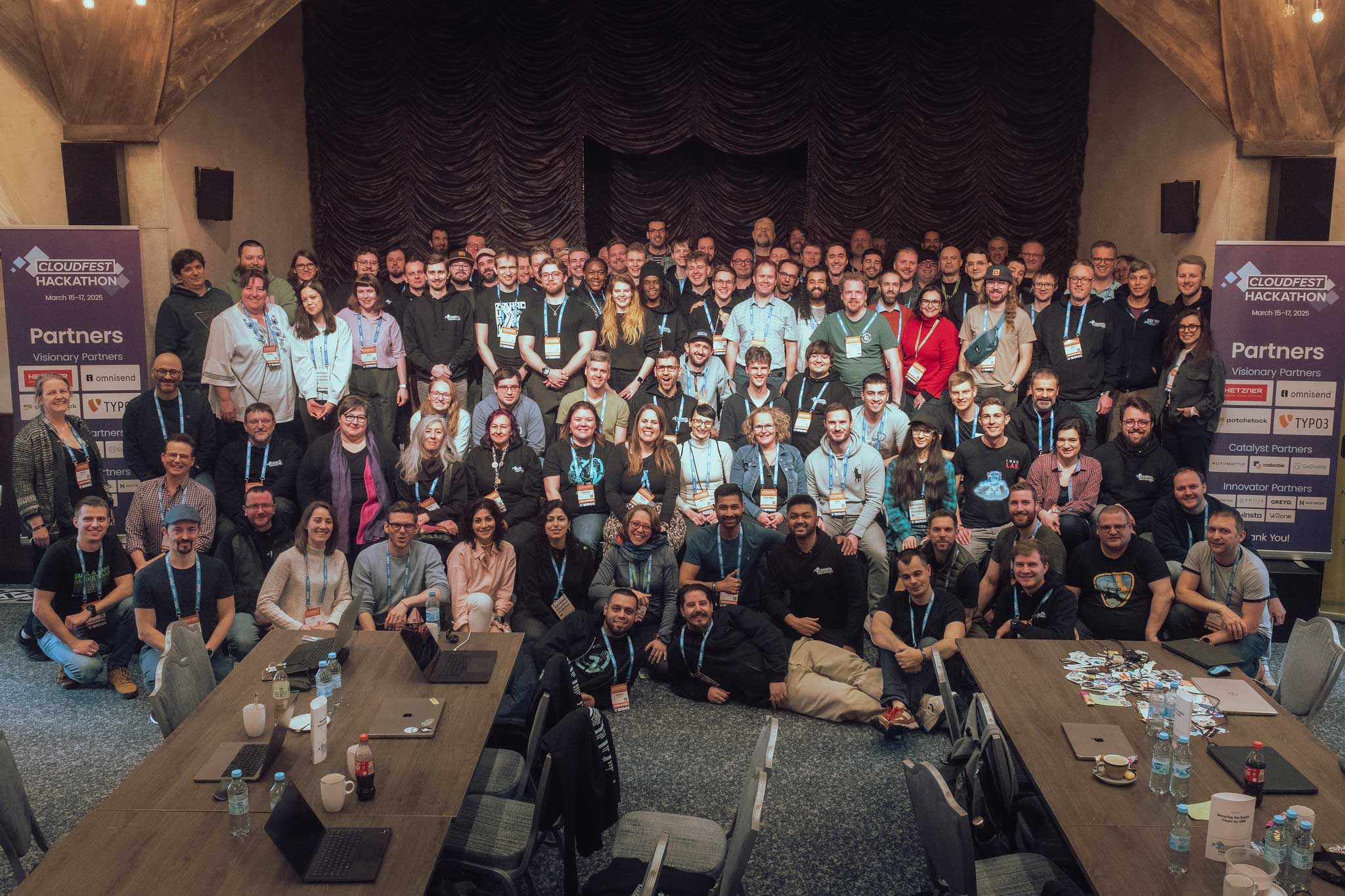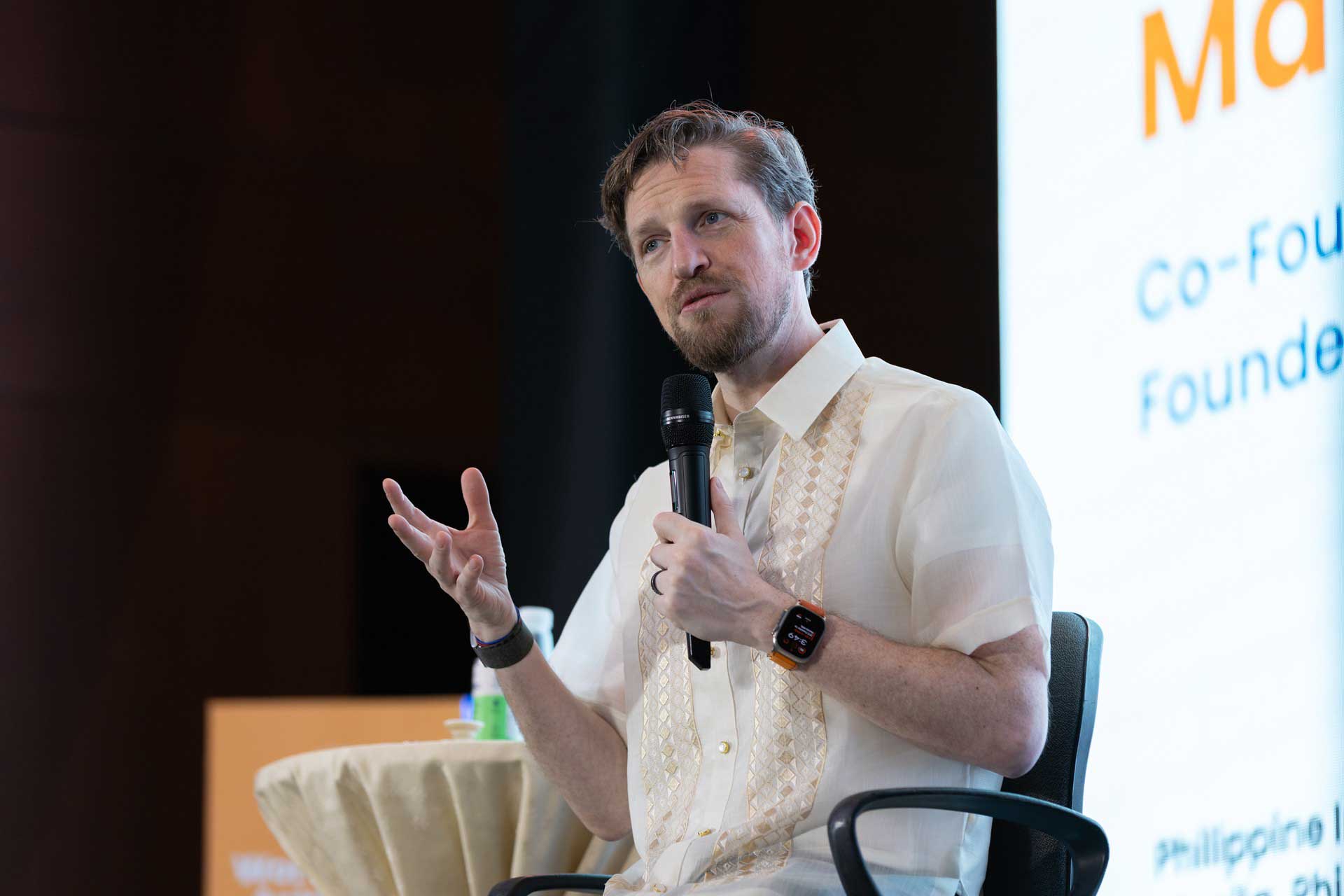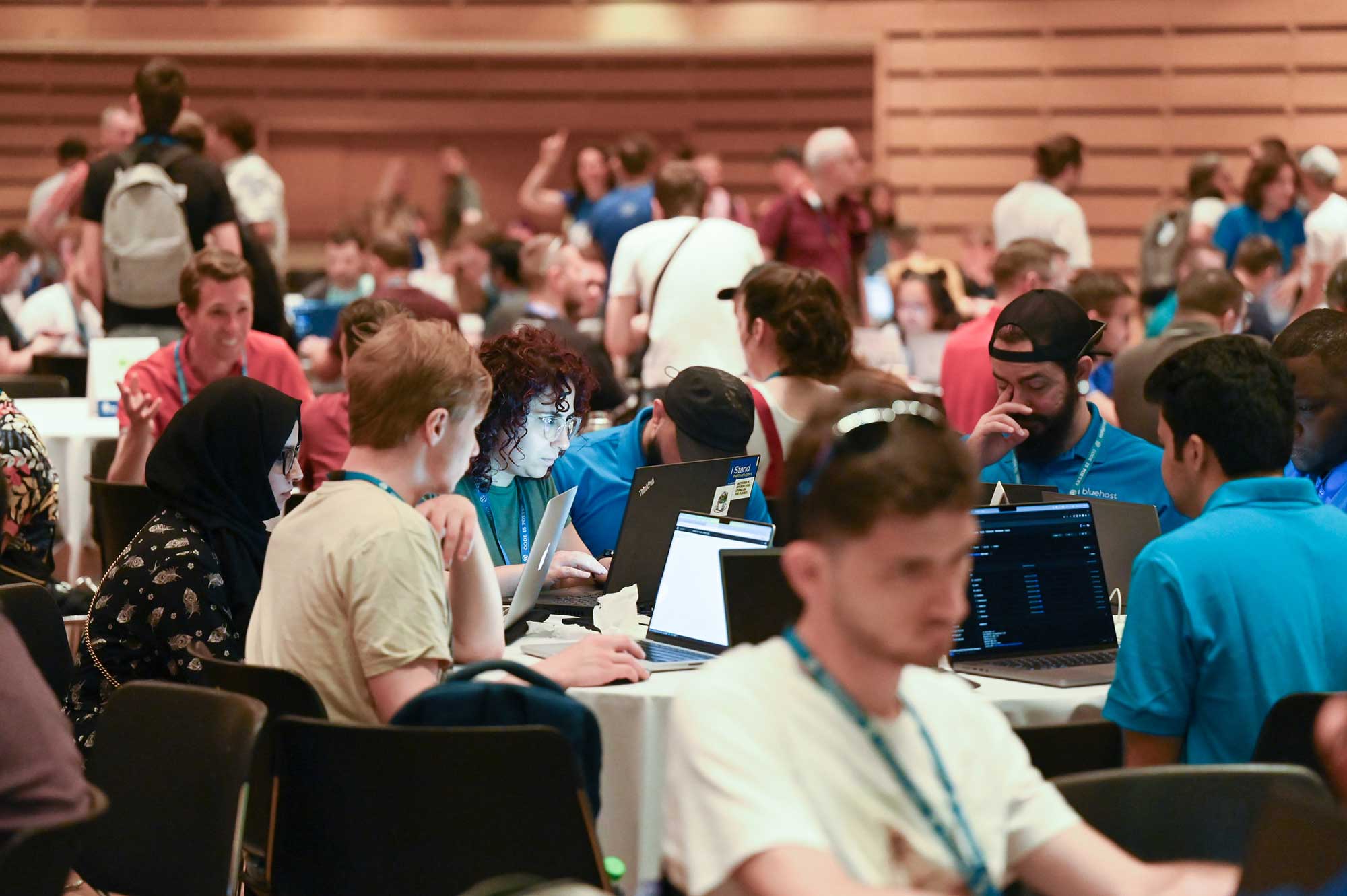While Visua11y took the top prize at this year’s CloudFest Hackathon, it was just one of 10 projects that tackled ambitious, real-world challenges—from federated AI frameworks to CMS migration tools. With the weekend wrapped, teams are now shifting focus to a different kind of challenge: keeping the momentum going now that the Hackathon has ended.
Held March 15–17 at Europa-Park in Germany, CloudFest Hackathon has grown into much more than a weekend sprint. Now in its eighth year, the event has refined its format to emphasize long-term impact, structured collaboration, and community-led innovation.
Carole Olinger, Head of CloudFest Hackathon, told The Repository before the event that her focus this year was on sustainability: “It’s one thing to build something exciting in three days. It’s another to make sure people hear about it, get involved, and help it evolve into something lasting.”
That shift was clear throughout the weekend. Olinger and her project support team introduced new post-Hackathon initiatives—media partnerships, follow-up tracking, and mentorship—to help projects continue to make an impact.
Here’s a look at all 10 projects that emerged from CloudFest Hackathon 2025:
1. Peer-to-Peer Federated RAG Framework
Project: A decentralized AI knowledge-sharing network for improving information retrieval across different domains.
Leads: Wesley Stessens (Synio) and Franco Lombardo (A-Cube).
Overview: This project tackles a core challenge in generative AI: how to retrieve the right context for complex queries. Instead of relying on a single source, the team built a peer-to-peer federated Retrieval Augmented Generation (RAG) framework that allows expert nodes to collaborate and reach consensus on the most relevant information—enabling smarter, more reliable AI responses.
Hackathon highlights: The team’s breakthrough was a vector-based peer-to-peer retrieval protocol using embeddings, built for speed and security. They integrated and improved open-source tools like Libp2p and LLPhant, and developed a full end-to-end MVP using Go, Python, PHP, Laravel, and Streamlit. Their decentralized network successfully exchanged vector embeddings during the event, thanks to a highly collaborative effort that stretched well into the night.
“Our objective was to resolve the issue of outdated information 🗞️ in pre-trained models, enhance content quality for specialized topics 🚧, and additionally prevent the possibility of data censorship 👀. The atmosphere was electric ⚡️—full of creativity, innovation, and inspiring people from all around the globe 🌍.” — team member Benjamin Burkhardt on LinkedIn. “
🏆 Awards: Tech Visionary and Dream Team.
What’s next: The team plans to present the project at upcoming conferences in Europe and continue development by refining the codebase, supporting multiple embedding types, and improving the consensus protocol.
💻 GitHub
2. CMSFreedom
Project: Helping users migrate sites seamlessly between CMS platforms like WordPress, TYPO3, and Jekyll by developing missing theme and data type adapters.
Leads: Patricia Brun Torre (self-employed) and Dennis Snell (Automattic)
Overview: The CMSFreedom team set out to solve a frustrating challenge: how to recover website content when backend access is lost. Their solution—a browser extension—enables users to retrieve content from sources like Archive.org or closed platforms, restoring control and preserving digital history.
Hackathon highlights: The team built a Chromium extension using WordPress Playground, LLM prompts, and HTML preprocessing to generate live CMS previews—no backend needed. A custom pipeline segmented rendered HTML into layout and content, extracted semantic components, and converted them into WordPress blocks. Tools like stamp_out()and extract()enabled precise content transformation.
A key breakthrough came early when the team decided to skip backend dependencies and rely solely on frontend parsing. This constraint became a strength, as LLMs proved better than rule-based parsers at identifying semantic structure. Smaller LLMs underperformed, while commercial models suffered from throttling, so the team combined structured logic with LLM inference for consistent results.
“We imagine a future where CMSs share a layer of abstraction. If a developer wants to move a site from WordPress to Jekyll or TYPO3, or resurrect a long-lost site from a screenshot, the process should be understandable, modular, and not feel like digital archaeology.” — Dennis Snell, CloudFest Hackathon 2025: CMSFreedom
🏆 Award: Pitch Perfect (tied with “Securing the Supply Chain for OSS”)
What’s next: The team plans to improve the reliability of its prompt-and-processor system and develop CMS-specific tools to interpret WordPress blocks in native formats. They’re also exploring stripped-down Markdown as a more efficient LLM input. Long-term, CMSFreedom could evolve into a shared abstraction layer that facilitates cross-platform migration and helps preserve the web’s forgotten corners.
3. CMS Health Checks
Project: A standardized health monitoring system for CMSs like WordPress, TYPO3, Joomla!, and Drupal.
Lead: Oliver Bartsch (b13 GmbH)
Overview: The CMS Health Checks team introduced a smarter, standardized way to monitor website health—going far beyond simple uptime checks. Their refined RFC tackles critical issues like security flaws, broken services, and rising infrastructure costs caused by undetected problems, offering a more comprehensive and proactive approach to site reliability.
Hackathon highlights: The team enhanced the health-check standard with secure HTTPS-only requests, JWT Bearer Token authentication, and support for non-HTTP protocols. They upgraded the reference implementation, created ready-to-use integrations for TYPO3, WordPress, Sulu, and Drupal, and built a generic PHP integration for broader adoption. They also developed a new monitoring tool with improved visualizations and launched a project website with live demos and documentation.
A standout moment was building a fully functional WordPress plugin in just two hours—despite no prior experience—thanks to their refined reference implementation and Hackathon momentum. Their diverse team of developers, designers, marketers, and CMS experts used PHP, Apache, JavaScript, Nuxt.js, and AI-assisted tools to bring the project to life.
What’s next: The team plans to grow adoption of the CMS Health Checks standard within CMS communities and hosting providers. Their aim: to improve reliability, security, and transparency across the open web.
4. WP-CLI as an MCP Host
Project: Bringing AI-powered development workflows to WP-CLI using the Model Context Protocol (MCP).
Lead: Pascal Birchler (Google, WP-CLI maintainer).
Overview: This project aimed to integrate the Model Context Protocol (MCP) into WordPress development workflows—making it possible to interact with local WordPress installations using natural language prompts and AI tools directly via WP-CLI, without needing a live site or REST endpoints.
Hackathon highlights: Working at the edge of emerging tech, the team built a robust MCP server that exposes REST API routes and WP-CLI commands as callable functions. They paired it with an MCP client capable of interfacing with multiple servers, and added provider-agnostic LLM integration for natural language processing. They also pushed the boundaries with AI-driven image editing using Google’s just-released Gemini API—available only days before the event.
Their fast-moving, cross-functional approach resulted in a flexible, AI-ready terminal interface with huge potential.
🏆 Awards: Social Media Master and second place overall.
What’s next: The team is exploring a path to bring the MCP server to WordPress core or release it as a plugin, paving the way for more accessible AI integrations. Their code is open on GitHub, inviting community collaboration to build on this early momentum.
💻 GitHub
5. Securing the Supply Chain for OSS
Project: Developing tools to help open-source projects meet increasing regulatory security requirements.
Leads: Néstor Angulo de Ugarte (Patchstack) and John Blackbourn (Human Made, WordPress Core Security Team Lead)
Overview: The Securing the Supply Chain for OSS team tackled one of the most urgent challenges in open source: software supply chain security. With new regulations like the EU Cyber Resilience Act raising the bar, the team set out to create a CMS-agnostic solution for generating Software Bills of Materials (SBOMs)—a critical tool for tracking dependencies and improving transparency in open-source projects.
Hackathon highlights: The team quickly aligned around a flexible, lightweight PHP library—nicknamed SBOMinator3000—that generates SBOMs in two ways: by scanning files like composer.json and through static code analysis of plugins, themes, and source code. They also built Scaninator for code-based dependency scanning and Transformatron for converting between SBOM standards, with support for SPDX and CycloneDX.
Demonstrating impressive scope and execution, they delivered nine repositories with over 150 files and 16,000 lines of code. Integrations were built for WordPress (Site Health module + WP-CLI), TYPO3 (admin extension), and Laravel (Artisan command), proving the tool’s versatility across platforms.
Despite starting without a detailed roadmap, the 12-member team adapted quickly and continuously refined the project. A key insight was the lack of flexible, CMS-friendly tools—so they built their own.
“The impact for this tool is immense, not only because the ongoing regulations will start to fine those that don’t comply… but because it’s a needed change in the open-source ecosystem and a solid foundation for a more secure software supply chain.” — John Blackbourn
🏆 Award: Pitch Perfect (tie with CMSFreedom)
What’s next: The team’s solution lays the groundwork for widespread SBOM adoption across open-source CMS ecosystems. By supporting developers, agencies, hosts, and compliance teams, it’s positioned to strengthen the entire supply chain. The work is open on GitHub, and future development will focus on extending integrations, refining standards support, and encouraging uptake across the WordPress and broader PHP communities.
💻 GitHub
6. AIccessibility Content Updater
Project: A WordPress plugin that improves accessibility by adding skip-to-content links, AI-generated alt text, and ARIA attributes.
Leads: Nemanja Cimbaljevic (GoDaddy) and Anthony Ledesma (GoDaddy)
Overview: The AIccessibility team set out to build a proof-of-concept WordPress plugin that could automatically detect and fix accessibility issues—helping site owners make their content more inclusive without manual intervention. While the initial goal was to create a fix-all tool using AI, feedback from accessibility experts at the Hackathon prompted a thoughtful pivot: from automation to education, focusing on helping users understand and address issues as they arise.
Hackathon highlights: The team began by targeting common accessibility problems, including missing alt text on images, absent “skip to content” links, and improperly formatted buttons. After shifting their approach, they prioritized native HTML5 tags over ARIA attributes, aiming for cleaner, standards-based fixes.
Leaning into their technical strengths, they built a Linux command executable in PHP to deliver machine-readable JSON output. Their image recognition system matched site context with machine vision results, assigning a “relevancy” score to guide whether alt tags should be updated or images marked with aria-hidden.
While full “skip to content” implementation proved difficult due to limitations with full-page screenshots, the team added an unexpected win: an enhancement to the WordPress media library that can generate alt text based on website context. The result was a promising demonstration of real-time, AI-powered accessibility improvements—especially in areas like media handling.
What’s next:The team plans to continue development, refining alt tag generation and expanding support for complex sites like e-commerce and learning platforms. With a balance of automation and guidance, AIccessibility aims to help WordPress users take meaningful steps toward a more inclusive web.
💻 GitHub
7. CMS Cloud Manager
Project: Simplifying hosting management for CMS users, allowing non-technical users to set up and maintain their own infrastructure.
Leads: Markus Kostrzewski (Hetzner Online GmbH) and Javier Casares (ROBOTSTXT.es)
Overview: The CMS Cloud Manager team set out to simplify CMS hosting by building an open-source alternative to proprietary cloud deployment tools. Their solution empowers users—regardless of technical expertise—to choose a CMS and cloud provider, answer a few basic questions, and spin up a secure, fully configured server in minutes.
Hackathon highlights: The team built a complete system with three core components: a web-based control panel for collecting user input and generating YAML configs, a CLI tool for provisioning servers via cloud provider APIs, and an Ansible-based implementation system to configure services and install applications. All CMS deployments run in Docker containers, enabling easy volume management, migration, and backups across infrastructures.
Python served as the project’s backend glue, with a strong focus on security—sensitive data like API keys are stored locally. Despite the project’s complexity, several components were already running within six hours, and by the final day, the team had a fully integrated system ready to demo. The result: a powerful, user-friendly tool that lowers the barrier to professional-grade CMS hosting.
What’s next: The team hasn’t yet shared specific plans for future development.
8. WordPress Staging Environment Manager
Project: A plugin to automate and secure staging environments for WordPress and WooCommerce.
Leads: Tadas Pukas (Omnisend) and Paulius Lescinskas (Omnisend)
Overview: This project aimed to reduce the friction and risk involved in managing staging environments—especially for WooCommerce store owners and developers who regularly move data between staging and production. The team focused on creating a tool that validates setup, automates selective content syncing, and improves usability with in-dashboard guidance.
Hackathon highlights: The team developed a fully functional, open-source plugin called Staging2Live that offers a smoother way to configure staging environments. Key features included:
- Environment validation, such as checking that
WP_ENVIRONMENT_TYPEis correctly set and outgoing emails are disabled - Selective content sync with anonymization of sensitive user data during transfers
- Visual prompts to help users complete setup correctly
Built with PHP and JavaScript, the plugin leverages native WordPress APIs and supports extensibility via hooks and custom settings. Initially designed with Omnisend and WooCommerce users in mind, the architecture is flexible enough to suit developers, agencies, and hosting providers.
“Over the weekend, our team built and released an open-source WordPress plugin, Staging2Live, that helps set up staging environments and sync changes back to live. Tens of millions of WordPress store owners struggle with staging environments, and we wanted to tackle that head-on.” — Tadas Pukas, LinkedIn
What’s next: The team has made the plugin publicly available and is welcoming contributors. Future plans include refining the automation logic, improving user experience, and tackling real-time sync for high-traffic eCommerce sites.
9. Federated Community Events
Project: A decentralized alternative to Meetup.com for local organizers, powered by the Fediverse.
Leads: Andreas Heigl (software developer) and Matthias Pfefferle (Automattic)
Overview: This team set out to solve a growing pain for community organizers: reliance on expensive, centralized platforms like Meetup.com. Their goal was to build a federated event-sharing solution using ActivityPub, empowering organizers to host and discover events across the Fediverse, while retaining full ownership of their tools and data.
Hackathon highlights: The team started out by aligning on shared definitions of “federation” and “community events,” then created a Community Event Starter Kit to make federated platforms more accessible—especially for non-technical users.
Working closely with developers from Mobilizon, RdfPub, and the WordPress ActivityPub plugin who were on their team, they contributed to documentation, reported and addressed platform issues, proposed updates to the ActivityPub standard, and built Docker setups to support local experimentation. They also designed onboarding flows to streamline the experience for new organizers.
Beyond the technical work, the team focused on messaging—crafting clear, approachable language to help event organizers understand the value of decentralized infrastructure.
By the end of the weekend, they had strengthened both the technical foundation and the communication tools needed to help communities move away from centralized event platforms.
What’s next: Work continues post-hackathon to refine the starter kit and raise awareness about decentralized event platforms. The team is also exploring how ActivityPub-based event federation could be extended to other frameworks and CMSs, laying the groundwork for a more open, user-controlled event ecosystem.
10. Accessible Infographics (Visua11y)
Project: A new accessibility standard and WordPress plugin for screen-reader-friendly infographics.
Leads: Anne-Mieke Bovelett (accessibility consultant)and Nina Jameson (Gehirngerecht Digital GmbH)
Overview: Visua11y set out to solve a widespread but often overlooked accessibility challenge: making infographics usable for everyone. The team’s goal was to create a plugin and standard that could transform infographics into accessible alternatives—with just two clicks.
Hackathon highlights: Thanks to weeks of preparation—including the creation of a GitHub repository, a Kanban board, and documentation—the team hit the ground running. By the end of day two, they had a working MVP: a WordPress plugin that uses AI-powered OCR to scan an infographic and generate an accessible version automatically.
With one click, the plugin reads the infographic; with another, it generates an alternative text-based output suitable for screen readers. The team focused on making the tool simple and immediate—so content creators could improve accessibility without technical expertise or hours of manual work.
Despite the intensity of the event—and the unique neurodiverse needs of several team members—the group maintained a structured, collaborative environment that kept momentum high. Their solution was praised by jury members for its usability, real-world impact, and potential to improve accessibility across platforms where infographic-heavy content is common and rarely inclusive.
“I wasn’t thinking about getting any awards. I just wanted to get it done—and for the whole world to understand the importance of accessible infographics.” — Anne-Mieke Bovelett, Visua11y Wins CloudFest Hackathon With Breakthrough Accessibility Plugin
🏆 Awards: Overall Winner #CFHack2025 and Breaking Barriers Award.
What’s next: The team plans to submit Visua11y to the WordPress.org plugin repository as a free plugin, with a potential premium version offering bulk processing and advanced AI features. They’re also finalizing onboarding tools to allow users to connect their own API keys, and writing documentation to support broader integration. With early interest from investors, Visua11y is well-positioned to become a flagship example of accessible, open-source innovation.
🌐 Website
Wrapping up
CloudFest Hackathon 2025 showed what’s possible when bright minds come together with purpose, creativity, and a shared commitment to the open web. From accessibility breakthroughs and AI-powered workflows to CMS migration tools and infrastructure automation, this year’s projects reflected a wide range of technical ambition and real-world relevance.
What set this year apart wasn’t just the quality of the demos—it was the renewed focus on what comes after. With mentorship programs, media partnerships, and community support structures launched during the event, teams left with the tools and encouragement to keep building. As Hackathon lead Carole Olinger put it: this isn’t just about what you can build in three days—it’s about what you can grow in the months and years that follow.
And if the work on display at the Hackathon is any indication, there’s plenty to be excited about.
Find out more about this year’s projects on the CloudFest Hackathon website.
The Repository is a proud media partner of CloudFest Hackathon 2025.
Image credit: Roan de Vries.








